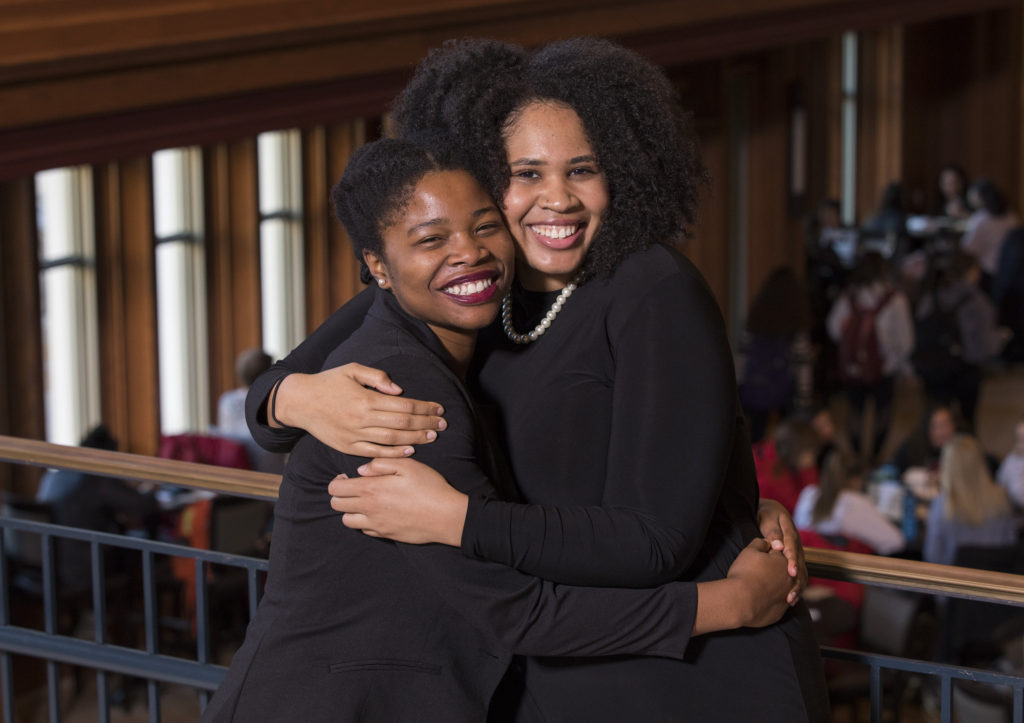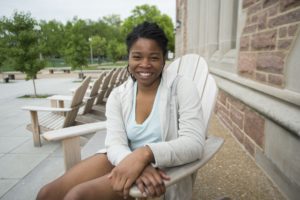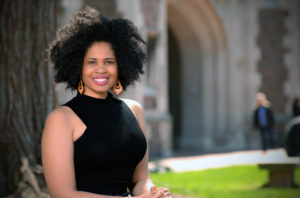
Washington University in St. Louis seniors Camille Borders and Jasmine Brown have been selected as Rhodes Scholars. One of the world’s most prestigious academic honors, the scholarship provides an opportunity to earn an advanced degree at Oxford University. Borders and Brown were among 32 students selected from across the nation on Nov. 18.
Borders and Brown are Ervin Scholars, members of Alpha Kappa Alpha sorority and good friends.
“It’s been amazing to go through this process with someone who has been such a good friend and such an inspiration,” Brown said. “I can’t believe we are going to do this together. Sharing this experience is an amazing blessing.”
“I have known Jasmine since freshman year,” Borders said. “As Ervin Scholars, we have grown together. Also, as members of Alpha Kappa Alpha Sorority Inc., we have developed a lifeline sisterhood sustained by service and scholarship. I am so ecstatic to win this amazing honor with a brilliantly intelligent and motivated young woman, who I can call a friend and a sister.”
Brown and Borders represent the 28th and 29th Rhodes Scholars selected from Washington University over the years. The last time two students associated with the university were selected in the same year was in 2006 when Leana Wen, a student at the Washington University School of Medicine, and Aaron Mertz, 22, a 2006 alumnus, were named scholars.
Brown, 21, is majoring in biology and intends to earn a PhD in neuroscience at Oxford University while continuing her efforts to fight implicit bias against minority students in academia and the lab. She hails from Hillsborough, N.J.
Borders, 21, is majoring in history and plans to pursue a master of philosophy degree in social and economic history, studying the global slave trade and the factors that led to its eventual demise. She was raised in Cincinnati.
“We are extraordinarily proud to have not just one, but two Washington University students honored as Rhodes Scholars,” Chancellor Mark S. Wrighton said. “I am ecstatic for Camille and Jasmine. This is one of the highest honors our students can receive, and I could not be more pleased that the Rhodes Scholar selection committee has recognized their many gifts and accomplishments with this prestigious award. I have no doubt they both will continue to shine as they share their talents with the world as Rhodes Scholars.”
An ‘uncommon mind’

Brown has distinguished herself as a researcher who effortlessly segues from one vexing medical challenge to another. Currently, she is a research assistant at the Washington University School of Medicine, where she is working to uncover the molecular pathways that West Nile and Zika viruses travel to infect the brain.
Previously, she studied lung cancer at the Broad Institute of MIT and Harvard, tested the antitussive effects of specific drugs at Johns Hopkins University School of Medicine, and analyzed the long-term neurological effects of cocaine and other stimulants on the adolescent brain at the University of Miami Miller School of Medicine. She also is a participant in the MARC U-STAR program, funded by the National Institutes of Health.
“I have a lot of questions,” Brown said. “What I love about science is that it gives me the tools to generate answers and to improve human health. It’s a fun process for me, but also a satisfying one because I can make an impact.”
James B. Skeath, professor of genetics at the School of Medicine, called Brown the total package — a good person and a good scientist who is smart, hardworking, curious and creative.
“In her talks, Jasmine sets up the logic and rationale of her work beautifully and then clearly articulates her data, what it means, why it’s significant and what to do next,” Skeath said. “This ability to make the complex simple, to break down complicated biological processes and problems into easily digestible and understandable points, only manifests itself in top students. It reflects an uncommon mind and a depth and breadth of understanding that only a few can obtain.”
Brown has learned some tough lessons in the lab as well. When a researcher hesitated to let Brown into her lab, Brown realized she was the sole black scientist in the building.
“Unfortunately, I soon learned that many other students of color have had similar encounters, leading many to experience imposter syndrome, questioning if they truly belong in the research community,” Brown wrote in her Rhodes application.
She decided to start the group Minority Association of Rising Scientists (MARS) to support underrepresented students and to educate faculty members about implicit bias. She has been working with the National Science Foundation to expand the program across the nation.
“If we want to advance science, we need people from different backgrounds who think in different ways,” Brown said.
MARS is inspired, in part, by Brown’s experience as both a Rodriguez and an Ervin scholar at Washington University.
“The nurture and support I got from those programs is something I want MARS to provide to minority scientists,” Brown said. “Those programs, as well as the professors I’ve connected with at WashU, made me realize I am not disempowered and that I could extend that network of support to other people who don’t have that community.”
Brown also has served as a member of Synapse, which prepares high school students for the Brain Bee; a candidate for Mx. WashU, which raises money for City Faces; and a participant in Black Anthology and the African Student Association Fashion Show.
Academia and activism

Borders, who is also a Stamps Scholar, arrived at Washington University in August 2014, shortly after the shooting death of Michael Brown in nearby Ferguson, Mo. She quickly became active in campus and community protests and active in creating the group Washington University Students in Solidarity to facilitate race-relations dialogues and institutional change on campus.
A defining moment occurred that fall, when Borders and many others “were tear-gassed while peacefully protesting in front of the Ferguson Police Department,” Borders remembered. “As I ran in a foggy haze, among the cacophony of sirens and screams, my breath jagged and eyes watering, I decided my life would be dedicated to promoting racial equality.”
Amidst these tumultuous events, Borders discovered a scholarly home in her history classes, which helped her to explore the roots of contemporary unrest. “Organically, my activism grew intertwined with my interest in academia and research,” she said. “My love for knowledge and intellectualism is inherently tangled with my desire for equality.”
The following year, Borders was selected as a Mellon Mays Undergraduate Fellow and served as research assistant for the oral history project “Documenting Ferguson.” In 2016, she researched the Trans-Atlantic slave trade at the University of Bristol as part of the Fulbright Summer Institute, and, in 2017, she spent six months at the University of Ghana, studying history and creative writing.
She currently is working on her senior honors thesis, “The Possibility of Desire: Sexual Choice within U.S. Colored Troops Widows’ Pensions,” which explores how, after the Civil War, newly freed black women navigated issues of citizenship and intimacy.
“Mimi is an intellectual force of nature,” said her adviser, Iver Bernstein, professor of history and director of American culture studies in Arts & Sciences. “She combines interpretive originality with laser-like attention to both the particulars of everyday life and to the big questions of American political history. What does it mean to have a self, to be a citizen, to be free?”
Jeffrey Q. McCune Jr., associate professor of women, gender and sexuality studies, called Borders “a born scholar of the best kind.”
“She is rigorous, ambitious, creative, intelligent — a focused, independent thinker of great humility and integrity,” McCune said. “Her work connects theory and history in a mature and masterful way.”
To learn more about the Rhodes Scholarship, visit rhodesscholar.org.